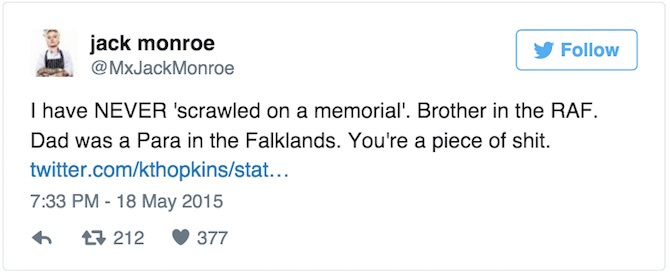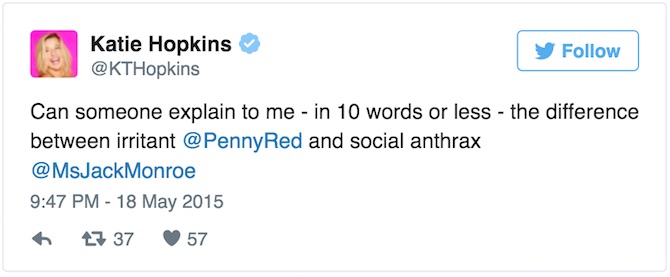Katie Hopkins refused appeal after losing libel case to Jack Monroe

Controversial columnist and broadcaster Katie Hopkins has lost her appeal over a legal battle with Jack Monroe.
Monroe won libel proceedings against Hopkins after she tweeted untrue claims about the vandalism of a war memorial.
Food writer Monroe, who identifies as gender non-binary, was awarded £24,000 in damages and £107,000 in court costs. Monroe told PinkNews that the court costs will be going towards their legal fees.

Katie Hopkins (Photo by Ian Forsyth/Getty Images)
Hopkins took the case to Court of Appeal after she was rejected in April last year.
The court has also rejected the case – meaning the former Apprentice candidate must cough up the full costs and damages of the case.
Lady Justice Sharp wrote in her verdict: “In my opinion, none of the grounds raised has a real prospect of success, and there is no other compelling reason why an appeal should be heard.”
She added: “The application for permission to appeal is therefore refused.”

Jack Monroe (Chris Jepson)
Hopkins now has no further right of appeal.
The original ruling found that the tweets had caused “real and substantial distress” to Monroe and that the food writer is entitled to “fair and reasonable compensation”.
Following the original result, Monroe tweeted: “It”s taken 21 months but today the High Court ruled that Hopkins statements to/about me were defamatory.
“I sued her for libel. and I won.”
Jack Monroe agreed to be referred to with female pronouns in the case, and so the judge’s ruling was as such.

Jack Monroe
RELATED: Katie Hopkins joins far-right website that argued gay people persecute Christians
Mr Justice Warby ruled in the original case that “whilst the claimant may not have proved that her reputation suffered gravely, I am satisfied that she has established that the publications complained of caused serious harm to her reputation”.
He said their publication “not only caused Ms Monroe real and substantial distress, but also harm to her reputation which was serious”.
The judge concluded: “Monroe is entitled to fair and reasonable compensation, which I assess at £24,000.”

Katie Hopkins (Getty)
Ms Hopkins, who was fired from her job at Mail Online for making false claims, made inferences in a Tweet about the vandalisation of a war memorial.
Last May, after a war memorial was vandalised with the words “f**k Tory scum”, Hopkins tweeted Monroe asking them: “Scrawled on any memorials lately? Vandalised the memory of those who fought for your freedom? Grandma got any more medals?”
Monroe tweeted to Hopkins saying they would not sue if she paid £5,000 to a charity supporting migrants, and issued an apology.


Rather than apologising, Hopkins deleted her original tweet and admitted that she had meant to tweet writer Laurie Penny, who had written about the incident at the time.

The judgement also concluded that, “it is, to my mind, an inescapable conclusion that the ordinary reasonable reader of the first Tweet would understand it to mean that Ms Monroe ‘condoned and approved of scrawling on war memorials, vandalising monuments commemorating those who fought for her freedom.’
“I find that the reasonable reader, knowing these innuendo facts, would have understood the Second Tweet to mean that Ms Monroe ‘condoned and approved of the fact that in the course of an anti-government protest there had been vandalisation by obscene graffiti of the women’s war memorial in Whitehall, a monument to those who fought for her freedom.'”
During the case, lawyer William Bennett told Mr Justice Warby: “The claimant’s primary case is that by reason of the seriousness of the allegations and the scale of publication, serious harm to reputation has been caused.

Ann Coulter (L) and Katie Hopkins (Getty)
“A widely published allegation that someone has either vandalised a war memorial or approved of such an act will inevitably cause serious damage to reputation.”
Defending Ms Hopkins, Jonathan Price told the judge in a written argument that the case was “relatively trivial dispute arose and was resolved on Twitter in a period of several hours”.
He argued that “no lasting harm, and certainly no serious harm”, to Monroe’s reputation resulted from it.
Monroe rejected his premise and told the court: “These proceedings have been a nightmare. It has been an 18-month, unproductive, devastating nightmare.
“I did not want to be here today. I have offered several times though my lawyer to settle these proceedings outside court. This is the last thing that I wanted to be doing.”
Monroe, who writes for various publication including the Guardian, revealed their decision to come out as nonbinary transgender on Twitter in 2016.

